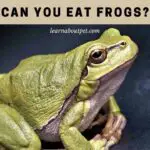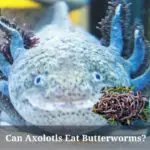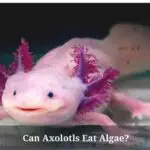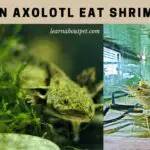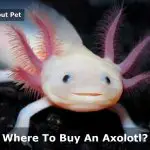There are times when you, as an axolotl owner, may consider feeding your axolotl on bloodworms. But before doing so, you will probably want to know whether axolotls can eat bloodworms and if yes, how to go about feeding them on the bloodworms. This article addresses those questions.
Can axolotls eat bloodworms? The answer is yes. Bloodworms are safe, delicious and nutritious to axolotls. But axolotls can’t get all the nutrients they need from bloodworms. Therefore you can’t feed an axolotl exclusively on bloodworms. You have to give the bloodworms as treats, alongside other foods.
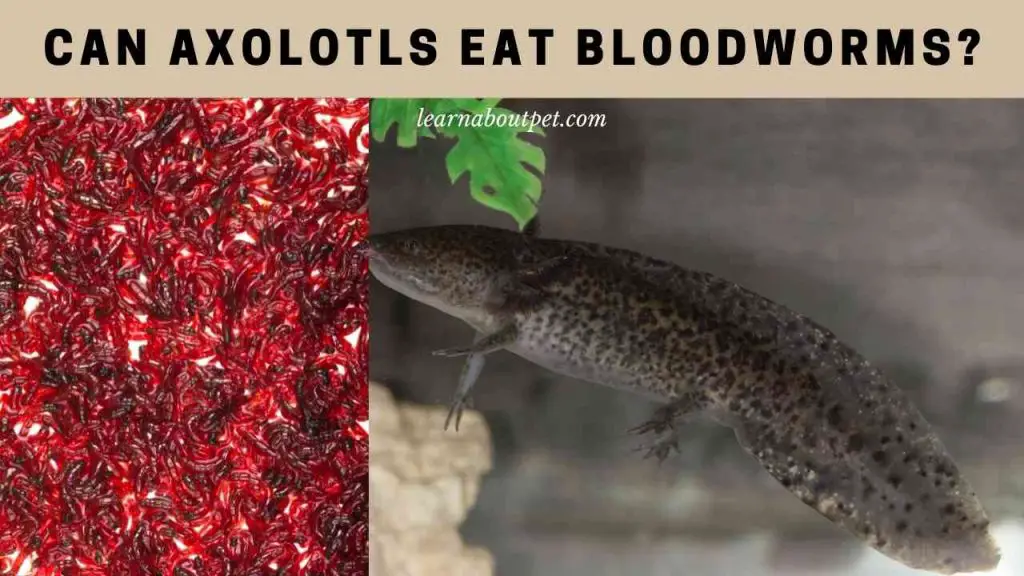
What Are Bloodworms?
In exploring the can axolotls eat bloodworms question, it may make sense for us to start by first finding out what the bloodworms in question are.
As it turns out, bloodworms are actually the larvae of midge flies.
They are red in color, like blood, hence the name ‘bloodworms’.
Can Axolotl Eat Bloodworms?
The best approach to take, in answering the can axolotls eat bloodworms question, is where we begin by finding out whether the axolotls have the ability to eat bloodworms.
So, do axolotls eat bloodworms? For instance, do axolotls eat bloodworms in the wild? The answer is yes. Axolotls do eat bloodworms. Actually, axolotls seem to enjoy eating bloodworms a great deal. This has led some people to refer to the bloodworms as ‘axie candy’.
Bloodworms are usually small enough and soft enough for axolotls to eat.
Further, in answering the can axolotls eat bloodworms question, we need to find out whether the bloodworms are safe for the axolotls.
Axolotls may love to eat bloodworms, but are the bloodworms safe for them?
The answer is that bloodworms are largely safe for axolotls: unless they are contaminated.
As long as axolotls eat them in moderation, they are safe.
Of course, if you feed an axolotl too many bloodworms, then there can be problems.
Do axolotls get impaction from bloodworms? The answer is no – unless one happens to feed the axolotl on too many bloodworms.
What are the health symptoms of eating bloodworms in axolotls? The answer is that there are really no health symptoms. That is unless one happens to feed an axolotl on too many bloodworms.
Or unless one happens to feed an axolotl exclusively on bloodworms. In the latter case, the axolotl may not get all nutrients it needs, leading to various health symptoms.
Finally, in answering the can axolotls eat bloodworms question, we need to find out whether the bloodworms are nutritionally beneficial to the axolotls.
And the answer is yes. The bloodworms do have some protein, fat, moisture and fiber: all of which an axolotl needs.
Can Axolotls Eat Bloodworms Exclusively?
Bloodworms do contain many of the nutrients that axolotls need. But they don’t have all of the nutrients that axolotls need.
Therefore if an axolotl feeds exclusively or mostly on bloodworms, it may miss out on some nutrients it needs.
Ideally, you should use the bloodworms as a supplemental food (or treat) for the axolotl.
Can Axolotls Eat Live Bloodworms?
Axolotls can eat live bloodworms.
When you feed an axolotl on live bloodworms, you get to arouse its snapping instinct. This is because it has to ‘snap’, in order to eat a live bloodworm.
Therefore if you want to excite an axolotl, one way to do so would be by giving it live bloodworms.
Then watch it as it comes to life ‘hunting’ the bloodworms.
If yours is a very young axolotl, it may only be able to eat small live bloodworms. That is because it may not be able to recognize dead/non-moving things as food.
The only challenge you may have is that of finding the live bloodworms. That is unless you can try to raise some in your backyard.
Most of the places that sell bloodworms sell them in dried (cubes) or frozen form.
But if you can find live bloodworms for your axolotl, then it will enjoy eating them.
Can Axolotl Eat Frozen Bloodworms?
An axolotl can eat frozen bloodworms.
Therefore if what are available to you are frozen bloodworms, you can proceed to feed your axolotl on them.
Do you defrost bloodworms for axolotl? The answer is yes. You need to thoroughly unthaw the bloodworms, before feeding your axolotl on them.
Therefore if you find frozen bloodworms, and you unthaw them properly, then give them to your axolotl, there should be no problem.
Can Axolotl Eat Dry Bloodworms?
Supposing that the ‘dry’ bloodworms in question here are those that are sold in ‘freeze-dried’ cubes form, then the answer is yes. Axolotls can eat such dry bloodworms.
But you will need to soak them in water first, to soften them.
Only after softening the bloodworms in this form can you proceed to feed your axolotl on them.
Therefore this is the answer to the can axolotls eat freeze dried bloodworms question. They can, but you usually need to soak the bloodworms first, to soften them, before giving them to the axolotls.

Can Baby Axolotls Eat Bloodworms?
Quite often, the person posing the can axolotls eat bloodworms question will be the owner of a baby axolotl.
Therefore what such a person wants to know is whether baby axolotls specifically can eat bloodworms.
So, indeed, can axolotls eat bloodworms when they are still in the ‘baby’ stage? The answer is ‘yes’. Bloodworms are among the safer foods for baby axolotls.
You only need to ensure that the bloodworms you give to the baby axolotls are suitably small.
Further, you may need to give the baby axolotls live (small) bloodworms. That is because the baby axolotls may not yet be able to recognize dead or non-moving things as food.
But if you place a small, live bloodworm in front of a baby axolotl, chances are that the axie will snap at the bloodworm, and proceed to devour it.
That in essence also answers the can baby axolotls eat frozen bloodworms question. So because the frozen bloodworms are non-moving, baby axolotls may not recognize them as food.
Generally though, if you can get suitable (small, live) bloodworms for the baby axolotls, they should in most cases be able to feed on them.
One may then ask, when can baby axolotls eat bloodworms?
And the answer is that most baby axolotls are able to eat bloodworms right from the earliest days of their lives.
There are people who give accounts of successfully feeding baby axolotls that are as young as 2 weeks old on bloodworms.
How Much Bloodworms Can You Feed Axolotls?
Most people who have experience in these matters recommend feeding an axolotl on as many live bloodworms as it will eat in 2 minutes. Then remove those that are uneaten after that period.
For frozen or dry bloodworms, the guideline is 5 minutes. So you feed an axolotl on as many dried or frozen bloodworms as it will eat in 5 minutes. Then remove those that remain uneaten after that period.
These guidelines apply to adult and baby axolotls alike. Therefore if you were at a loss on how many bloodworms to feed baby axolotl, this is still the guideline to go by.
But for a baby axolotl, you just need to give suitably small bloodworms.
Another pertinent question here is on how often to feed axolotls on bloodworms.
Now these worms function best as treats or supplemental food, rather than staple food. For that reason, it is ideal to only feed axolotls on the worms like only once per week.
That, by the way, is also the guideline you would likely get in the context of how often to feed mealworm to axolotls.
All this leads to another interesting question. That is on how to prevent axolotls from eating bloodworms in excess.
And all you need to do in that regard is ensure that you observe the 2-minute and 5-minute feeding guidelines.
Therefore remove any bloodworms that remain uneaten after 2 minutes (for live worms) or 5 minutes (for frozen/dried worms).
How To Feed An Axolotl Bloodworms?
Having answered the can axolotls eat bloodworms question, we may now proceed to deal with the aspect of how to feed the axolotls on the bloodworms.
The most straightforward approach is where you first grasp the bloodworms with tongs. Then you place them somewhere the axolotl can see them. Thereafter, the axolotl should be able to recognize them, and proceed to eat them.
If they are the bloodworms that come in cube form, you may need to cut suitable chunks. Then hold them with tongs, and place them where the axolotl can see them.
That can be the best approach, even when it comes to the question of how to feed baby axolotls bloodworms.
If they are the dry bloodworms, you definitely need to first soak them, so as to soften them. Then you grasp them with tongs, and place them before the axolotl.
You may also use a turkey baster to, as it were, inject bloodworms into the axolotl’s feeding dish.
That may work particularly well for frozen/unthawed bloodworms. Or for previously dried bloodworms which you have soaked into water to soften, and which may not be capable of being grasped with tongs.
So you use a turkey baster to suck them up, then deposit them into the axolotl’s feeding dish.
Final Verdict – Can Axolotls Eat Bloodworms
Axolotls can eat bloodworms. The bloodworms are delicious to the axolotls. And they are also safe as well as nutritionally beneficial to the axolotls.
You can feed an axolotl on live, frozen or freeze-dried bloodworms.

Because the bloodworms may not contain all the nutrients that an axolotl needs, you can’t feed it exclusively on bloodworms. But you can use the bloodworms as treats or supplemental food.
As a pet lover, make sure to learn about pet more and give your pet axolotl a good and comfortable life!

Welcome to Learn About Pet. My name is Rajkumar Ravichandran and I love all pets, travel, and amazing food. I write about my passion and personal experience caring for multiple pets in this blog! ❤️
Post Disclaimer
DISCLAIMER: THIS BLOG OR WEBSITE, "Learn About Pet", DOES NOT PROVIDE YOU WITH MEDICAL ADVICE AND IS NOT A SUBSTITUTE FOR MEDICAL ADVICE. ALWAYS GET IN TOUCH WITH YOUR PERSONAL VETERINARIAN AND USE INFORMATION HERE AS GENERAL ADVICE.
The information, including but not limited to, text, graphics, images and other material contained on this website are for informational purposes only. No material on this site is intended to be a substitute for professional veterinary advice, food recommendation, diagnosis, or treatment. Always seek the advice of your veterinarian or other qualified health care provider with any questions you may have regarding a medical condition or for pet food related questions.
